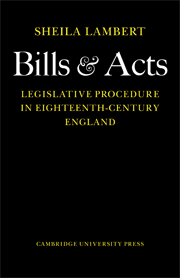Book contents
- Frontmatter
- Contents
- Preface
- Abbreviations
- Introduction
- 1 Robert Harper and parliamentary agency
- 2 Treatises and handbooks
- 3 The clerks: fees and agency
- 4 Parliamentary business
- 5 Private bill procedure
- 6 Estate bills
- 7 Inclosure bills
- 8 Local bills
- 9 Promulgation of the statutes
- 10 Conclusion
- Appendix I List of bills drawn by Robert Harper
- Appendix II Note on parliamentary sources
- Index
- Frontmatter
- Contents
- Preface
- Abbreviations
- Introduction
- 1 Robert Harper and parliamentary agency
- 2 Treatises and handbooks
- 3 The clerks: fees and agency
- 4 Parliamentary business
- 5 Private bill procedure
- 6 Estate bills
- 7 Inclosure bills
- 8 Local bills
- 9 Promulgation of the statutes
- 10 Conclusion
- Appendix I List of bills drawn by Robert Harper
- Appendix II Note on parliamentary sources
- Index
Summary
Not unnaturally, the greater part of Robert Harper's practice was concerned with that ‘most notable achievement of the conveyancers’, the classical strict settlement. Although the papers themselves have not survived, his indexes show that Harper drew innumerable agreements of this kind, as well as the attendant conveyances, wills and mortgages relating to his clients' lands. These agreements were protected by the courts and did not require legislation; indeed, so well were they protected that legislation was often needed to unsettle them, and thus arose the eighteenth-century private estate acts. It says much for the conservatism of landed families that, just as they felt obliged to ‘continue in the tradition of re-settlement’, they did not even more often resort to procedure by private act, which was cheap, expeditious and very effective.
Very little work has been done on the contents of these acts, although they contain information which must be of importance for local and economic history. It is to be wished that they could be analysed in geographical groupings, taking into account the local and inclosure acts for the same time and place. It will often be found that a landlord intent on developing his own estate by private act will be taking the lead in inclosure and other measures in his locality.
- Type
- Chapter
- Information
- Bills and ActsLegislative procedure in Eighteenth-Century England, pp. 110 - 128Publisher: Cambridge University PressPrint publication year: 1971

